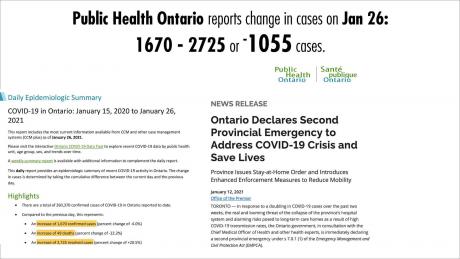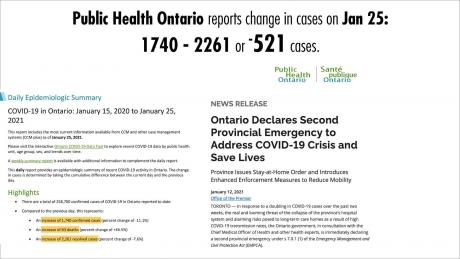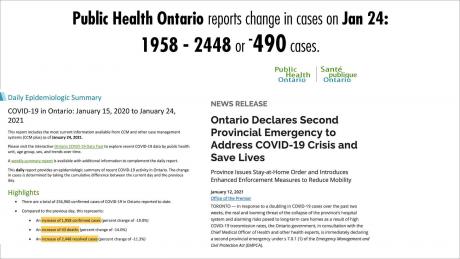Governments, news and even hospitals are claiming that without locking down society the healthcare system would collapse. Yet, we only need take a look at headlines of flu seasons gone by to see that hospitals have dealt with far greater surges of respiratory illnesses without collapsing.
Here are just a few samples:
2019: “Some of Ontario’s biggest hospitals are filled beyond capacity nearly every day”
Before the “pandemic” hit Canada, on January 22, 2019, CBC News wrote this article stating that “hospital gridlock… is the new normal.” See for yourself:
Overcrowding has become so common in Ontario hospitals that patient beds are now placed in hallways and conference rooms not only at times of peak demand, but routinely day after day…
An exclusive analysis of the data by CBC News shows that hospital gridlock — a phenomenon that used to be restricted to surges in patients during flu season — is the new normal.
In contrast, today, during this so-called “new normal,” hospitals are being under-utilized. “Ontario’s hospital capacity is better than before pre-pandemic….” wrote Roman Baber, a minister of the Ontario parliament in a recent letter to the province’s premier. “Urban area hospitals are always above capacity at this time of the year — that’s why we campaigned on ending Hallway Healthcare.”
2018: “Hospitals Overwhelmed by Flu Patients Are Treating Them in Tents”
A year earlier, January 18, 2018, Time Magazine wrote:
The 2017-2018 influenza epidemic is sending people to hospitals and urgent-care centers in every state, and medical centers are responding with extraordinary measures: asking staff to work overtime, setting up triage tents, restricting friends and family visits and canceling elective surgeries, to name a few.
Extraordinary measures; but not insane. They were facing a veritable epidemic, yet they did not even propose healthy people stay in their homes as some kind of far-fetched remedy.
2018: Rapid increase in seasonal flu cases taxes area hospitals
2018 was a big year for the flu, as we can see from this January 11, 2018 article in University of Alabama News:
UAB Hospital Emergency, Critical Care, Ambulatory and Prime Care services have experienced a 50 percent increase in seasonal influenza cases in the past 72 hours alone. These events led Alabama Gov. Kay Ivey to issue a State of Emergency this evening.
Yes, Alabama had an emergency. But Spain didn’t go into lockdown to avoid getting the Alabama flu.
2018: “California hospitals face a ‘war zone’ of flu patients — and are setting up tents to treat them.
The same month, on January 16, 2018, the LA Times reported:
Hospitals across the state are sending away ambulances, flying in nurses from out of state and not letting children visit their loved ones for fear they’ll spread the flu. Others are canceling surgeries and erecting tents in their parking lots so they can triage the hordes of flu patients.
I wonder if these journalists, who throw around this “war zone” hyperbole, have ever been to a real war zone. Typically, bullets and grenades make far gorier injuries than pneumonia.
2017: “French hospitals cancel operations amid brutal flu epidemic”
A year earlier, on November 1, 2017, France 24 reported:
“Emergency rooms are at breaking point,” François Braun, head of France’s Samu-Urgences de France ambulance group, told AFP on Wednesday. “All regions of France are affected.”
Yet did they order everyone in France to start wearing masks? No. Maybe masks weren’t invented yet.
2014: “CDC says nation hits epidemic status“
On December 31, 2014, Dayton Daily News reported:
The Center for Disease Control and Prevention said this week that the flu has reached the epidemic threshold nationally and is widespread in 36 states. Four pediatric flu-related deaths have been confirmed in Ohio, including an infant less than six months old in Cincinnati.
Four children sadly died from the flu, yet kids were still allowed to go to school. In my province of Ontario, no children have died from COVID, yet none are allowed to attend school.
2013: “Hospitals overwhelmed by flu and norovirus patients”
On January 10, 2013, CTV News reported:
“In our emergency rooms, we would normally see about 150 patients a week with influenza; now it’s nearly 700,” Dr. Bill Dickout, medical director for the Edmonton zone of Alberta Health Services, told reporters Wednesday.”
So how is COVID-19 any different? Or has influenza simply hired a better PR team?
2011: “Hospitals overwhelmed by surge of flu cases”
The Globe and Mail, January 11, 2011, printed this shocking statement:
A surge in seasonal influenza cases in parts of the country has clogged hospital emergency rooms, postponed elective surgeries…
Is not COVID sounding like that Shreddies commercial? You know, the one where they tilt the square breakfast cereal on the side and rebrand it “Diamond Shreddies.”
2009: “Swamped hospitals fear an ER emergency”
On May 1, 2009, the LA Times reported:
On Long Island, N.Y., hospitals are scrambling to bring extra workers in to handle a 50% surge in visitors to emergency rooms. In Galveston, Texas, the local hospital ran out of flu testing kits after being overwhelmed with patients worried about having contracted swine flu.
At Loma Linda University Medical Center near San Bernardino, emergency room workers have set up a tent in the parking lot to handle a crush of similar patients. In Chicago, ER visits at the city’s biggest children’s hospital are double normal levels, setting records at the 121-year-old institution.
Obviously, hospitals are prepared (or at least should be) for seasonal rises in respiratory illnesses.
2009: “‘Walking well’ flood hospitals with — or without — flu symptoms”
May 5, 2009, CNN reported:
This week, some hospitals saw record numbers of patients. A few emergency departments shut down to paramedics because of overcrowding. “We have had a lot of nervous patients with minimal respiratory tract symptoms,” said Dr. Mark Bell, principal of Emergent Medical Associates, which operates 18 emergency departments in Southern California. “It has caused significant amount of delays in emergency care. They’re all walking well.”
This reminds me of the testimony of undercover nurse Erin Olszewski. She said patients with anxiety and mild respiratory issues were being intubated at New York hospitals.
2000: “Early Flu Outbreak Has Hospitals Overflowing”
January 1, 2000, the New York Times brought in the New Year with these words :
This year’s wave of influenza has become widespread across the nation, overwhelming emergency rooms in cities from Boston to Los Angeles, filling hospital beds and forcing postponements of operations as staff members turn to treating the rising number of flu patients….
The Centers for Disease Control in Atlanta said this year’s outbreak had arrived much earlier than usual and had increased death rates from pneumonia and flu-related illnesses.
Of course, they didn’t shut down businesses. Indeed, since health care is very expensive, ruining the economy probably didn’t seem like a viable solution.
1999: “Health Lorry used as mortuary as ‘flu strikes hospitals”
Over in England, on January 5, 1999, BBC News shared this familiar story:
A hospital spokesman said emergency admissions were up 50% on last year, and fewer burials and cremations over Christmas and the New Year had created a body jam.
Sounds like New York City, in the spring of 2020; sans the world-wide hysteria.
1993: “Beijing Flu Outbreak Pounds L.A. County”
The LA Times, December 29, 1993, reported:
An outbreak of Beijing flu has swept Los Angeles, boosting absenteeism at local companies, schools and government offices and sending droves of feverish people to doctors’ offices and hospitals, health officials said Tuesday.
As a Toronto-area nurse wrote in an open letter, regarding the second wave of COVID: “Bottlenecks have always occurred in [urban hospitals]; old, inadequate infrastructure, for a baseline, unhealthy population.”
1978: “Texas-Type Flu Sweeps Across Area“
Lastly, going back to the year of my birth, January 7, 1978, the The Washington Post wrote:
Influenza has hit the Washington metropolitan area with such force that the emergency room staff at the Children’s Hospital National Medical Center has been overwhelmed and has called for volunteer help from other hospital staffers.
That was just a sample of what you can find searching the archives of mainstream news sites. It becomes clear that flu outbreaks appear every year. Some years are worse than others. They are typically not labelled as a global pandemic.
How to Rebrand the Flu For Prime Time News
But just consider how easy it would be to give separate cold and flu outbreaks — appearing in, let’s say, China, Italy and New York — the same name. Then, instead of keeping it on the back pages of the newspapers, you print it on the front page. Instead of the last few minutes of a newscast, you make it the feature story. Every day. Week after week.
Then you have government tell everyone to wear masks. Which they do. Then you tell them the masks have stopped the flu. What a relief!
But sadly, this other new virus is so much smarter than the flu. Indeed, it is now killing about the same amount of people as the flu was. What a coincidence!
Alas, no one would fall for that. They’d see right through such an obvious ploy. Wouldn’t they?







Comments
- Reply
Permalink